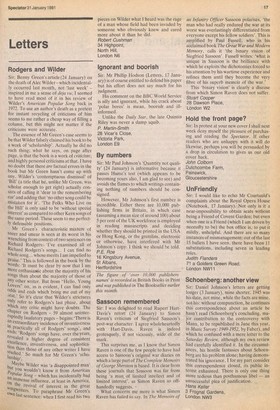Rodgers and Wilder
Sir: Benny Green's article (24 January) on the death of Alec Wilder-which incidentally occurred last month, not 'last week' inspired in me a sense of deja vu; I seemed to have read most of it in his review of Wilder's American Popular Song back in 1972. To use an author's death as a pretext for instant recycling of criticisms of him seems to me rather a cheap way of filling a column, but this might not matter if the criticisms were accurate.
The essence of Mr Green's case seems to be that Wilder falsely claimed his book to be a work of 'scholarship'. Actually he did no such thing; what he says, on page after page, is that the book is a work of criticism; and highly personal criticisms at that. I have no doubt that there are factual errors in the book but Mr Green hasn't come up with any. Wilder's 'contemptuous dismissal' of 'Bill' (a title that he, unlike Mr Green, was scholar enough to get right) actually consists of calling it 'dear to the remembering ear' and adding that `no other song could be mistaken for it'. 'The Folks Who Live on the Hill' is only said to be 'without special interest' as compared to other Kern songs of the same period. These seem to me perfectly defensible positions.
Mr Green's characteristic mixture ,of sneer and smear is seen at its worst in his wrenching from context of two sentences on Richard Rodgers:. 'I've examined all of Richard Rodgers's songs... I can find no Whole song... whose merits! am impelled to Praise.' This is followed in the book by the words: 'It must be clear by now that I am more enthusiastic about the majority of his songs than about the majority of those of any other writer. But from "Hello, Young Lovers" on, as is evident, I can find only Odds and ends which bring me out of my seat.' So it's clear that Wilder's strictures only refer to Rodgers's last phase, about Which any critic might have doubts. The chapter on Rodgers 59 almost uninterruptedly laudatory pages begins: 'There is nn extraordinary incidence of inventiveness m practically all of Rodgers' songs', and ends: 'Rodgers' songs have, over the years, revealed a higher degree of consistent te.xcellence, inventiveness, and sophistica:ton than those of any other writer I have udied.' So much for Mr Green's 'scho larship,. Maybe Wilder was 'a disappointed man' You wouldn't know it from American riopular Song which has incidentally had i _n immense influence, at least in America, o_on the revival of interest in the great s Nwriters. To paraphrase Mr 'Green's tW n last sentence: when I first read his two pieces on Wilder what I heard was the rage of a man whose field had been invaded by someone who obviously knew and cared more about it than he did.
Robert Cushman • 34 Highpoint, North Hill, London N6






































 Previous page
Previous page